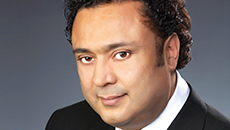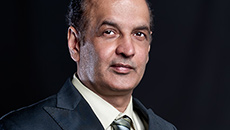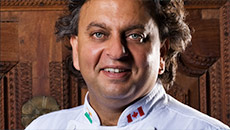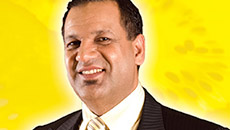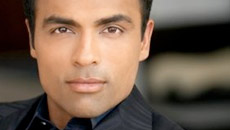“They who give have all things; they who withhold have nothing.” –Hindu Proverb
Where do you begin to describe two rich lives that form a synergy of compassion, brilliance and love? Hari and Madhu Varshney are success stories of two individuals who grew up in rural India and left the security and comforts of family, friends, occupations and their home country to travel to a new land in search of higher learning, and eventually settling down, creating new paths and fulfilling dreams. These trailblazers came to Canada at a time when there weren’t many people of South Asian descent residing in this vast land, and through determination, perseverance and education, paved a road for not only themselves, but for their children, grandchildren and extended family.
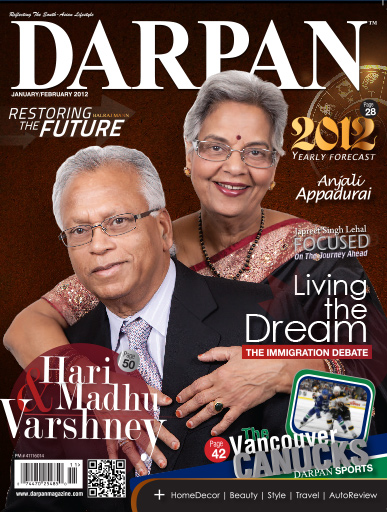
“My parents are givers. All three children, our spouses and eight grandchildren are so proud of our parents as they’ve worked hard to establish themselves in Canada but also have impacted and changed so many other lives, from aunts, uncles and cousins that have all moved here or are back in India to friends, charities and organizations they’ve supported through finances or time,” says Praveen Varshney, who is a partner at Varshney Capital Corporation.
The Early Years
Hari was born on November 7, 1941 in Kazimabad, a small village of 3,000 people in the state of Uttar Pradesh (UP), India. He was the second eldest of five brothers, and his father was head of the local government, which governed 21 villages. He completed school up to Grade 8 in his village, than travelled 5 kilometres by bike to another town to complete his high school education. He received a scholarship for Agra University and enrolled in the Bachelor of Commerce degree program. He gave the extra money to his parents, and would visit Kazimabad on weekends. Out of 50,000 students, Hari received the highest marks and was named the Chancellor’s Gold Medalist. He received another scholarship, which he used to obtain his Masters of Commerce. Once again, he was the top student out of 20,000 students and was offered a teaching position as a lecturer at one of the colleges in Agra.
In a town close to Moradabad, Madhu was born in Sarai Tarin on September 23, 1943. She was also the second eldest of 7 children. Her father worked for the Central Bank of India, and the family often moved to various cities in UP. Madhu, who is also an Agra University alumni, completed her Bachelors degree in Literature, specializing in Hindi, English and Sanskrit. She then completed two Masters degrees, one in Economics and the other in Hindi Literature.
When Hari met Madhu…
Hari started teaching in 1962 and during this time, Hari and his parents were approached by several families with marriage proposals for their daughters. One of the fathers was Madhu’s father, who had heard about Hari’s achievements and wanted to ensure he would be an ideal match for his daughter. Hari agreed to meet Madhu, and in the late summer, he travelled a few hours by train to her aunt’s house in Aligarh to meet her.
Hari had seen a photo of Madhu, but he wasn’t prepared for how beautiful she was in real life. “That was it – it was love at first sight,” says Hari with a grin on his face. “Madhu had the most beautiful eyes. I had found my Wahida Rahman.”
Hari and Madhu corresponded by writing letters to one another for 6 months, and were married in Sitapur, which is close to Lucknow, on February 18, 1963. The couple moved to Agra, where Hari continued to teach. He realized his salary wasn’t enough to support a family and that he had the capability and education to find a better job. He was hired by a conglomerate called Modi Industries in Modinagar, and was the administrative head of Modi Arc Electrodes, a new division of Modi Industries. In addition, Madhu worked as a teacher in an elementary school.
Life was good in Modinagar, it was a short drive to New Delhi and its vibrant city culture; the salary was 2-3 times that of a teacher; the company provided a furnished residence, a car and driver; and best of all, Hari and Madhu’s two boys, Praveen and Peeyush were born in 1964 and 1966.
Journey to Canada
One fateful day in 1967, Hari opened up the newspaper to find job advertisements offering triple the salary for individuals who had a Masters of Business Administration (MBA). “I’d never heard of such a degree, it was relatively new at that time; up until then all the business students I knew pursued their Master of Commerce degree,” says Hari.
He was determined to obtain his MBA, but the only problem was the program was not offered in India, so Hari applied to universities overseas in Canada and the United States. Most of the universities required students to pay for their first year, than they would grant scholarships based on marks. However, Hari could only afford to go overseas if he received a scholarship.
The University of British Columbia sent a letter to Hari stating that he would need $2,300 for tuition and residence for the MBA program. He told them he did not have the money and needed a scholarship. In turn, UBC was the only university to grant Hari with a $1000 scholarship based on his previous university marks. “This was a blessing from the heavens for me, as I could manage the $1,300,” adds Hari.
Hari credits Madhu as his biggest supporter, as she always encouraged him to go ahead and follow his dreams. He was worried about leaving his wife and two children behind in India, but she said “Go ahead, I will manage.” So, Hari decided to travel to Canada alone, complete his MBA program and return to his family in India when he was finished. “I knew I would miss him terribly, as would our two young sons, but my nature is such that if a person wants to do something good, I always encourage them to follow that path,” adds Madhu. On September 30, 1967, Hari was the first Varshney in his family to ever leave India. He was sad to leave his family behind, but he knew this was a step in the right direction.“I always believe that you have to take the risk and jump,” says Hari. “You never know how life will turn out. I didn’t know where Vancouver was or a single soul there but I was determined to do my MBA.”
Oh, Canada!
Hari was met at the Vancouver International Airport by Narayan Tiwari, a ‘buddy’ assigned to him from UBC, who was also from India and a PhD student in Microbiology. Tiwari was a great help to Hari in those first few weeks, and aside from the initial culture shock, Hari was able to adapt and integrate quickly. In addition to his studies, Hari took on two jobs, one as a busboy in the graduate studies cafeteria and the second at the UBC library, re-shelving books. Despite working two jobs, he began to run low on funds and didn’t want to take any money from Madhu, so he decided to approach Dean Walter Gage.
“I explained my situation to Dean Gage and told him that UBC had granted me a $1,000 scholarship, but it wasn’t enough to cover my expenses despite my two jobs, which were interfering with my studies. So I asked him for another $1000,” says Hari with a chuckle. “The dean said, “I’ll give you $500” and I was in heaven, as my scholarship was now $1500 and I wouldn’t need money from Madhu.”
Fate struck again – as Hari was walking on campus, he saw accounting firms arranging interviews with UBC grad students. He had always wanted to be a Chartered Accountant (CA) in India, but at that time (50 years ago); you had to pay the accounting firm to article for them. He didn’t want to pay the firms in India and decided to sign up for interview with Canadian firms.
Hari was hired by Arthur Andersen, which was the largest CA firm in the world at that time, and within three months of arriving in Canada, he already had a job. He now had to decide, whether to complete his two-year MBA program at UBC or accept the CA position that would pay $500 a month.
He learnt that UBC granted MBA students up to 5 years, off campus to complete the degree. So, he decided to complete 18 credits of course work and increased his work load to achieve this in one year, then he started working full-time as a CA student at Arthur Anderson in May 1968. The plan was to return to UBC after a few years, to complete the thesis portion of the MBA program.
Hari began to enjoy life in Vancouver, and asked his family to join him to experience the city, its landscape and culture. Madhu, Praveen and Peeyush arrived in Canada in October 1968 and the family was reunited after 13 months of separation. “I picked them up from the airport in my second-hand Dodge car and drove them around the city, showing them my favourite sights,” Hari recollects. “One of the first places I took them was to Spanish Banks so they could get a taste of Vancouver’s natural beauty.” Hari and Madhu were approved for ‘UBC marital housing’ and moved on campus with the boys. Living in Canada was tough for Madhu at first, as there were language and cultural barriers and she didn’t have additional help for the family. She decided to start working as an Avon salesperson to learn the language, and went door-to-door with Peeyush, who was adored by clients. She also took on another position as a data-entry clerk. Hari worked at Arthur Andersen during the day, and Madhu worked the second position at night to ensure that one of them was with the children.
Decision Time
Do we stay in Canada and continue to carve our path here? Or do we leave and return back to India?In 1971, Hari completed his CA and no longer qualified for a student visa. It was decision time, either to head back to India or apply for landed immigrant status in Canada. After many long discussions and an employment offer from Arthur Anderson, Hari and Madhu decided to stay. They bought their first house at Elliott and East 47th in Vancouver’s Killarney neighbourhood. Hari and Madhu’s third child, a daughter named Vandana was born in 1
Hari worked at Arthur Andersen for 14 years and during this time, he achieved his CA, was a senior auditor for 3 years, a manager for 6 years and became a principal at the firm. He left in 1982 and established his own CA firm, “never looking back, I made more money in that first year.” He built an audit practice of public companies over the next 3 years.
After auditing companies and watching their founders and promoters risk $100,000 to obtain an IPO (initial public offering or stock market launch) to become a public company, he thought, “Why don’t I do the same thing? Risk some money and be successful like them.”
Inspired by the creation of public companies, Hari created Varshney Capital Corporation, a venture capital firm, in 1986. Over the years, his son Praveen, who is also a CA, joined the company; followed by son Peeyush, who is a corporate/commercial lawyer. Additionally, Madhu left the Royal Bank of Canada after working there for 11 years to join the family business.
“Our only limitations are the ones in our own head. In business and in life, I’m a risk taker,” says Hari. “I believe the sky is the limit and you’ll never know how successful you can be unless you try.”He continued by saying, “Every human being has the same potential for success, but not every human being has the same courage to try.”
Cultivation of the Arts
Madhu, who is a Katthak classical dancer, established the successful “Indo-Canadian Folk Dance Group” in 1986, which performed at various functions and celebrations, including Vancouver’s Expo 86, Folk Fest, Canada Day and diverse charity and multicultural events. A lover of music and dance, Madhu has led a number of workshops at UBC, Simon Fraser University and Shadbolt Centre for the Arts teaching individuals of all ages, including her daughter and three grandchildren, the beautiful, traditional folk dances of India.
“My mother’s poetry is a direct reflection of her spirituality and love of philosophy, nature and family,” says Vandana, a senior investment advisor. “She has always been passionate about the arts, music and dance – it fills her with energy and inspiration.”
Madhu, an award-winning writer and poet, has published 7 books, including “Bhav Tarang,” a collection of her poems; a collection of folk songs titled “Lok Geet Sangrah;” and 5 spiritual and religious books. She entered a poetry contest in 1996 and won the Editor’s Choice Award for her nature poetry. Madhu also received The National Library of Poetry award for her outstanding achievement in poetry. She has completed three additional books, which will be published this year. Of these, one is another collection of her poems titled “Uthatee Hiloren.”
“I have been writing since high school, and my inspiration comes from the philosophy of God, family relationships, darpan (self-reflection) and nature, I enjoy writing about the ocean,” she says.
It’s fortunate for Canada; more specifically Vancouver that Hari and Madhu Varshney remained in this nation, as they have made a cultural, social, economic and charitable impact to benefit overall society.
Charity Work
From UNICEF and the University of British Columbia to St. Paul’s and BC Children’s Hospital Foundations, Hari and Madhu along with their children and grandchildren have donated their time, money and fundraising efforts to a number of local, national and international organizations, charities and causes.
“I always joked, when you have Hari on board, you actually have the whole family because they’re very charitable and community-minded individuals and family,” says Jane Adams, president & CEO, Surrey Memorial Hospital Foundation. “It starts at the top with Hari and Madhu, who inspire that same type of community action in their children and their children married people who share those values. And so, the values Hari embraced in a spouse is likewise by his entire extended family.”
Adams, former executive director of St. Paul’s Hospital Foundation, and Hari worked together at the foundation, where Hari was a board member, vice chair and chair of the foundation and was responsible for the renowned ‘Lights of Hope’ campaign, which raises millions of dollars annually for the hospital. Hari, Madhu and their entire family were integral in building the campaign’s efforts.
For the last 15 years, the Varshney family has organized the “Varshney Capital Corp. Annual Charity Golf Classic” event that has raised over $1 million for local children’s charities, including Canuck Place, Room to Read and BC Children’s Hospital to name a few
The golf classic was a “great way to get our network of contacts and business associates involved in philanthropy supporting numerous children’s charities over the years. Anuja [Praveen’s wife, who is also a CA] and staff did such an incredible job organizing it that we would have people signing up for the next year, as soon as the current event ended,” says Praveen. “In terms of golf fundraisers, it became one of the most well-known and successful tournaments.”
Jaiya, their 11-year-old granddaughter, is a big supporter of various charitable causes of the family, in particular a Room to Read. On October 12, 2011, Jaiya was among 10 storytellers, the other nine were adults, at a Room to Read fundraising event in support of girls’ education worldwide.
Madhu is an active member of the Indo-Canadian community and is involved with various organizations. She was the President of the Vishva Hindu Parishad of BC, the largest Hindu Temple and community centre in Vancouver, for two years. She is a board member of the Arya Samaj Society of BC and in 2007, she donated $100,000 towards the purchase of a building to conduct the society’s cultural activities. In 2006, Madhu challenged the society to raise funds by promising to match the proceeds raised by them to increase the community participation. Madhu fulfilled her promise by giving a matching donation of $43,000.
More recently, in 2011, Hari and Madhu donated $100,000 to the Vancouver General Hospital (VGH) Foundation towards the purchase of the biplane angiography suite to have the most advanced state-of-the-art x-ray technology that provides physicians with a three-dimensional view in real time of the blood vessels of the brain, neck & spinal cord.
“I appreciate life, I feel close to God and believe in higher, cosmic powers,” says Madhu, adding “I have unconditional love for people, nature and relationships.”
Where it all Began
Hari often reminisces on his journey to Canada, “If UBC hadn’t given me the $1,500 scholarship to come here, which changed the lives of so many people, life would be completely different,” says Hari. “You have to be grateful to God in life and I am thankful, as this country has been so good to us.”
In 2007, Hari and Madhu donated $1 million to UBC’s Sauder School of Business to create the state-of-the-art Hari B. Varshney Business Career Centre. In addition, the couple created two BCom scholarships and two MBA entrance scholarships.
“Hari and Madhu Varshney are among the Sauder’s strongest supporters. Our relationship with their family runs extremely deep, as their three children all graduated from Sauder’s BCom program,” says Sauder’s Dean Daniel Muzyka.
Muzyka continued by saying, “Having received a scholarship when studying at UBC, Hari is extremely passionate about making business education accessible to good students and ensuring they have the tools needed to achieve their goals in the working world. By allowing us to considerably expand our career service, the Varshney’s helped create a launch pad at Sauder for student career success.”
In addition, the Varshney’s have donated more than $300,000 to UBC’s Centre of India and South Asia Research and sponsored the Hari and Madhu Varshney Lecture Series from 2005 to 2007.
The Next Chapter
“Hari and Madhu are joyful people – I’ve never seen either of them without a smile on their face. I think joy comes from inner peace and a strong value set and living that value set and so to me, they are value-driven, joyful people, who make everyone around them happy,” says Adams.
Hari credits Madhu for her support, love and dedication over the years, and for taking the leap of faith and settling in Canada. “Madhu has been in my life for so long; I can’t imagine her not beside me,” adds Hari.
“As a husband, Hari is more than I could ever have dreamed of,” says Madhu. After 49 years of marriage, you can still feel the love, respect and admiration between Hari and Madhu.
“My parents are each other’s best friend and they have always remained true to their faith, true to their belief in helping others and true to their love of family. They have taught us the power of a parent’s unconditional love,” says Vandana.
“They have really instilled an extremely strong sense of the value of family in all of us,” adds Peeyush. In this next chapter, we can’t wait to find out what big project or charity event, Hari and Madhu, along with the Varshney clan, are dedicating their time, money and efforts to.
Achievements
Hari and Madhu have received numerous awards recognizing their charity and community involvement and career milestones. Here are a few highlights:
Hari
1970 – First person of Indian descent to receive CA designation from Institute of Chartered Accountants of BC
2005 – Elected a Fellow of the Institute of Chartered Accountants of BC, receives FCA designation for his professional and philanthropic endeavours
2005 – Recipient of the Volunteer Vancouver’s 18th Annual Volunteer Recognition Award
2006 – Recipient of The BC Community Achievement Awards for community work and dedication
2007 – Hari, Praveen & Peeyush were the recipients of BC New Canadian Entrepreneur Award from the Ethno Business Council of British Columbia
2008 – Named as one of 100 Influential Indo-Canadians in B.C. by the Vancouver Sun newspaper
2009 – Voted as one of the Top 25 Canadian Immigrants in Canadian Immigrant People’s Choice awards
2009 – Selected to accompany Prime Minister Stephen Harper on his 3-day visit to India in November
2010 – Recipient of DARPAN Magazine’s Extraordinary Achievement Award for ‘Advancing Philanthropy’
Madhu
1980 to 2011 – numerous awards from Canada, United States and India recognizing excellence in writing and poetry, including The National Library of Poetry award
1980 to 2011 – United Way, UNICEF and Rim Jhim Awards to name a few
1986 – Regional Showcase Award of Merit (1986 World Exposition) for Contribution
1987/88 – Folk Fest Certificates for Participation and Rick Hansen Tribute
1996 – Editor’s Choice Award for Madhu’s nature poetry submission
2008 – recipient of The BC Community Achievement Awards for community work and dedication
2011 – the Varshney’s hosted the 3-day ‘Delhi Dialogue with The Dalai Lama and Dr. Abdul Kalam’ conference in the Taj Palace Hotel in New Delhi

